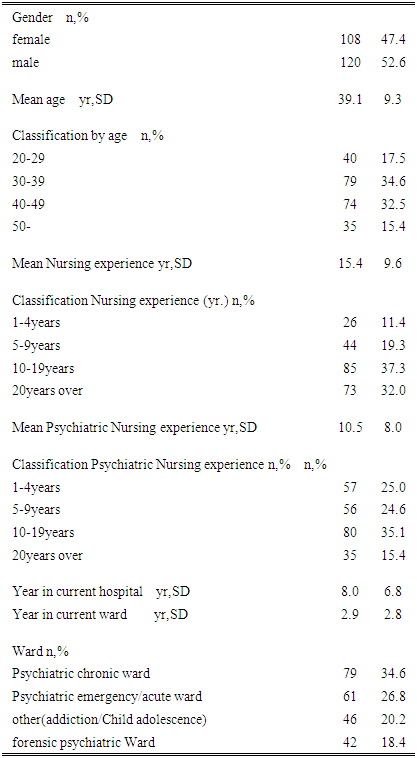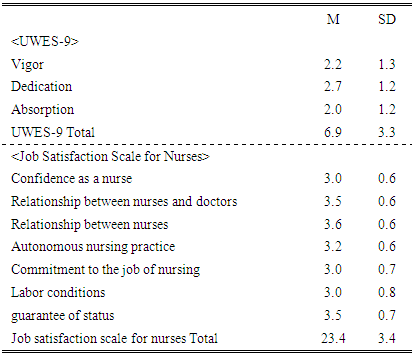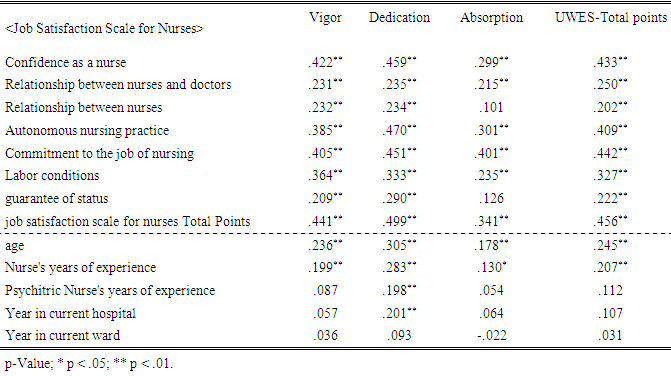-
Paper Information
- Paper Submission
-
Journal Information
- About This Journal
- Editorial Board
- Current Issue
- Archive
- Author Guidelines
- Contact Us
International Journal of Nursing Science
p-ISSN: 2167-7441 e-ISSN: 2167-745X
2018; 8(2): 21-26
doi:10.5923/j.nursing.20180802.02

Relationship between Work Engagement and Job Satisfaction of Nurses in Psychiatric Hospital
Toshihiro Hontake 1, Hiromi Ariyoshi 2
1Saga University Graduate School of Medical Science, Saga, Japan
2Saga University, Saga, Japan
Correspondence to: Toshihiro Hontake , Saga University Graduate School of Medical Science, Saga, Japan.
| Email: |  |
Copyright © 2018 Scientific & Academic Publishing. All Rights Reserved.
This work is licensed under the Creative Commons Attribution International License (CC BY).
http://creativecommons.org/licenses/by/4.0/

Objective: Our research objective to clarify the effect of job satisfaction on Work Engagement of nurses working in psychiatry. Method: A questionnaire composed of the Utrecht Work Engagement Scale (9item), Yamashita job satisfaction for nurse (25item) was distributed to 336 nurses working in psychiatric hospitals in Japan. Result: 283 surveys were collected (84.2% collection rate), and 228 surveys were considered valid (67.9% valid survey rate). In the correlation analysis, Confidence as a nurse and Commitment to the job of nursing had a significant correlation with Work Engagement. Also in the multiple regression analysis, these variables had a significant influence on Work Engagement. Discussion: Confidence as a nurse and Commitment to the job of nursing are necessary to maintain high Work Engagement. In light of the previous literature, the results of this study could not identify the characteristics of a nurse working in a psychiatric department.
Keywords: Work Engagement, Job Satisfaction, Psychiatric hospitals
Cite this paper: Toshihiro Hontake , Hiromi Ariyoshi , Relationship between Work Engagement and Job Satisfaction of Nurses in Psychiatric Hospital, International Journal of Nursing Science, Vol. 8 No. 2, 2018, pp. 21-26. doi: 10.5923/j.nursing.20180802.02.
Article Outline
1. Introduction
- Work Engagement is defined as a positive affective motivational state of fulfillment, manifested as vigor, dedication, and absorption [1]. The nurse's Work Engagement is enhanced by the leadership of the administrator, which leads to an increase in remarks at the conference [2]. And nurse's Work Engagement has a positive influence on the trend of the department, and as a result leads to improvement of Patient Centered Care [3]. Studies targeting nurses in Japan revealed that Work Engagement is related to age, marital status, years of experience, employment / work style, turnover intention among Nurses, role in the workplace, assistance of superiors (Fukuoka et al., 2013, Sato et al., 2014, Matsumoto et al., 2010, Kawauchi et al., 2011) [4-7]. Therefore, based on the Job demands-resource model, the authors surveyed the relationship between Work Engagement and Job resources (support of colleagues and superiors, fulfillment, degree of discretion) for nurses working in general hospitals and psychiatric hospitals [8]. The result revealed that "fulfillment" has the strongest influence on Work Engagement.Based on the results, the authors thought that it was necessary for the nurse to be satisfied with the work "nursing" and to have confidence as a nurse in order for the nurse to feel "fulfillment". In addition, previous studies for nurses do not clarify the relationship between Work Engagement and job satisfaction such as working conditions (such as identity security and salary).The job satisfaction of a nurse is positively correlated with the work environment, and it is related to the type of hospital establishment entity and ward [9].Job satisfaction affects intention to continue work [10]. And job satisfaction is necessary to bring about a good outcome of care to the patient [11, 12]. As with job satisfaction, Work Engagement affects the decline in nurse turnover rate [4].From this fact, the authors thought that job satisfaction contributed to a decrease in turnover rate by raising Work Engagement. In other words, the authors thought that satisfying with the work is creating a psychological state in which nurses are positive to work. However, previous studies so far have not clarified the impact of job satisfaction on Work Engagement.And the studies so far are not targeted to nurses working in psychiatric hospitals. Nurses working in many psychiatric hospitals are exposed to violence by patients [13]. In terms of job satisfaction, previous studies have revealed that violence against nurses by patients and their families lowers job satisfaction and reduces psychological well-being [14]. The authors revealed that Work Engagement falls by receiving violence from patients [15]. For this reason, since the working environment of psychiatric hospitals is distinctive, the authors decided to investigate the relationship between Work Engagement and job satisfaction of nurses working in psychiatric hospitals.Our research aims to clarify the effect of job satisfaction on Work Engagement of nurses working in psychiatry.By revealing the relationship between Work Engagement and job satisfaction, it will be possible to obtain new suggestions for nurses to continue working prospectively.
2. Method
2.1. Participants and Procedures
- The survey was carried out at three facilities in the Kyushu region, including three psychiatric hospitals. The facilities were selected from a national public hospital with a Forensic psychiatric ward. The reason for this is to investigate the current situation of nurses working in all types of psychiatric wards. In Japan, all hospitals with Forensic psychiatric ward are national public hospitals.In this study, for the purpose of minimizing the bias, the subjects were selected according to the following criteria.Ÿ Nurse experience over 1 yearŸ Not Nursing administratorŸ Regular employerŸ 2 shifts including night shifts, 3 shift work.Ÿ Not dementia wardsThe authors, who received consent from the subject hospitals, distributed the survey to 336 nurses, and retrieved the anonymous surveys at collection stations using the placement method.The surveys were collected at each facility and returned to us in a single batch. 283 surveys were collected (84.2% collection rate), and 228 surveys were considered valid (67.9% valid survey rate). The survey was conducted at psychiatric hospitals from June 12th through June 23th of 2017.
2.2. Questionnaire
- Basic attributes for analysis were gender, age, nursing experience, psychiatric nursing experience, years in current hospital, years in current wards, and current wards.Work Engagement: Work Engagement was measured by the Utrecht Work Engagement Scale-9(UWES-9) [16]. UWES-9 is composed of 3 sub-concepts of “vigor”, “dedication”, and “absorption”. Each of the 3 sub-scales consists of three items. The score on the sub-scales were calculated based on the Likert technique (0 point for “not at all” to 6 points for “always feel that way”). The higher the score on the UWES-9, the more positive the attitude towards work. The Cronbach α coefficient of this scale is .93 [8].Job Satisfaction Scale: Job Satisfaciton was measured by Yamashita job satisfaction for nurse (25item) [17]. This scale translated the job satisfaction scale of medical professionals Yamashita (1995) created by Stamp et al. (1978) and amended the item. Job satisfaction scale-25 is composed of 7 sub-scales of "Confidence as a nurse (4 items)" " Relationship between nurses and doctors (3 items)" "relationship between nurses (4 items)" "autonomous nursing practice (5 items)" "Commitment to the job of nursing (4 items) "," working conditions (3 items) "and" guarantee of status (2 items) ". The Cronbach α coefficient of this scale is .82 [18].The score on the sub-scales were calculated based on the Likert technique (1 point for” Do not think so at all “to 4 points for” Think that it is quite the same”) and evaluate with 7 factors 25-125 points. The higher the score on the Job satisfaction scales, the more Higher job satisfaction.
2.3. Analysis
- Descriptive statistics were used to clarify age, years of experience, scores of scores. Correlation analysis was carried out using each subscale of UWES - 9 and job satisfaction scale. The correlation analysis method is Pearson's correlation analysis. Next, multiple regression analysis was performed. It is to analyze whether Work Engagement is affected by job satisfaction and age, years of experience. For that purpose, we analyzed the subscale of UWES - 9 as a dependent variable. The step-wise method was used as the analysis method.We used SPSS ver.22 as our analysis software.
2.4. Ethical Considerations
- Approval was obtained for this study from Saga University Medical School Research Ethical Committee (28-63) and the ethical committees of the hospitals who granted permission for our surveys. There is no conflict of interest in this research. The authors used the measurement scales by obtaining approval from the creators.
3. Result
3.1. Basic Attributes
- Table 1 shows the basic attributes for the subjects. 108 nurses (47.4%) were females and 120 nurses (52.6%) were males. The mean age was 39.1 (SD±9.3). The average years of nursing experience was 15.4 years (SD±9.6), and the average years of psychiatric nursing experience was 10.5 years (SD±8.0). 79 (34.6%) of the subjects worked at Psychiatric chronic ward.
|
3.2. Questionnaire Score
- Table 2 shows the Questionnaire score. The average score of the job satisfaction scale was between 3.0 - 3.6 and total point was 23.4 point (SD±3.4). The average score of the UWES-9 was between 2.0 - 3.7 and total point was 6.9 point (SD±3.3).
|
3.3. The Relationship between Work Engagement and Job Satisfaction
- Table 3 shows the correlation between UWES-9, and the sub-scale of Job satisfaction scale. Table 4 shows the results of the multiple regression analysis conducted with sub-scale scores of Work Engagement as the dependent variables, and Job satisfaction as the independent variables. There was a strong correlation between “Commitment to the job of nursing” “Confidence as a nurse” and Work Engagement. The correlation between Work Engagement and experience years was low. The correlation coefficient with the Work Engagement was low in the experience years, and no significant result was shown in the multiple regression analysis.
 | Table 4. Result of multiple regression analysis with UWES-9 as dependent variable, Job satisfaction sale for Nurses, Nurse’s experience, Psychitric Nurse’s years of experience, Year in current hospital, and Year in current ward as independent variable (multiple regression analysis, Step-wise method) N=228 |
4. Discussion
- -Relation between Work Engagement and Job satisfaction-The reasons of Japanese nurses continue to work are reported to be "employment form (full-time / part-time)" "commuting distance / hour" "hoped working conditions" [19]. However, in this study, the impact of working conditions on Work Engagement was limited. As in the results of this study, Jenaro et al (2010) reports that remuneration can’t be a leading factor in Work Engagement [20].On the other hand, "Commitment to the job of nursing" and "Confidence as a nurse" had a significant influence on Work Engagement. This suggests that working conditions motivate to continue work, but to continue work positively, it is important to enhance occupational commitment and maintain and improve Work Engagement.A leading factor to promote Occupational commitment of nurses is a legitimate evaluation by the superior [21]. And Wong et al (2010) reveals that the leadership of the Nursing administer is a leading factor in Work Engagement [2].Based on these facts, it can be thought that legitimate evaluation by superior and colleagues in the workplace enhances the occupational commitment of nurses and Work Engagement.This suggests that the job commitment may play an important role in the process of the job resources of the JD - R model influencing the relationship with work (Figure 1).
 | Figure 1. The role of Occupational Commitment |
5. Conclusions
- Work Engagement is affected by "Confidence as a nurse" and "Commitment to the job of nursing" on job satisfaction. And this tendency was not limited to nurses working in psychiatric hospitals, but was common to many nurses.
ACKNOWLEDGEMENTS
- We would like to express our appreciation to the nursing management staff and the subjects who participated in our study for their time, efforts, and cooperation in our research.
References
| [1] | Schaufeli WB., Salanova M., Gonzalez-Roma V., et al, 2002, The measurement of engagement and burnout and a confirmative analytic approach. Journal of Cross Cultural Psychology, 33, 464-481. |
| [2] | Wong CA., Laschinger S., Cummings GG., 2010, Authentic leadership and nurses’ voice behavior and perception of care quality. Journal of nursing management, 18(8), 889-900. |
| [3] | Abdelhadi N., Drach-Z A., 2012, Promoting patient care: Work engagement as a mediator between ward service climate and patient-centred care. Journal of Advanced Nursing, 68(6): 1276-1287. |
| [4] | Fukuoka E., Taniguchi T., Kakehashi Y., 2013, The relationship between work engagement and a desire to leave employment among nursing staff: Including work-related stress. Nursing care research. 12(3), 1-10. |
| [5] | Matsumoto Y., Toyomasu K., Mihashi M., 2010, Study on the factors affecting on the work engagement of the nurses working at University Hospital: by use of Utrecht Work Engagement Scale. The Journal of the Kurume Medical Assosiation, 73, 138-146. |
| [6] | Kawauchi E., Ohashi K., 2011, Relationship among Work Engagement, Job satisfaction and Turnover Intention of Registered Midwives and Nurses Working in Public Hospitals Providing Secondary Medical Care. The Journal of the Japan Academy of Nursing Administration and Policies, 15(1), 39-46. |
| [7] | Sato Y., Miki A., 2014, Influences of Job Stress, Coping Profile and Social Support on Work Engagement among Hospital Nurses-A Comparative Analysis According to Their Years of Clinical Experience-. The Journal of Science of Labour, 90(1), 14-25. |
| [8] | Hontake T., Ariyoshi H.., 2016, A study on work engagement among nurses in Japan: the relationship to job-demands, job -resources, and nursing competence, Journal of Nursing Education and Practice,6(5), 111-117. |
| [9] | Zaid AH., Milisa M., Banerjee T., 2017, Jordanian Nursing Work Environments, Intent to Stay, and Job Satisfaction. Journal of Nursing Scholarship, 49(1), 103–110. |
| [10] | Mei FC., Cheng H., Chiou F., et al., 2016, Organisation-based self-esteem mediates the effects of social support and job satisfaction on intention to stay in nurses. Journal of Nursing Management, 24(1), 88-96. |
| [11] | Manojlovich, M., Laschinger HKS., 2002, The relationship of empowerment and selected personality characteristics to nursing job satisfaction. Journal of Nursing Administration, 32(11), 586–595. |
| [12] | Rochefort CM., Clarke SP., 2010, Nurses’ work environments, care rationing, job outcomes, and quality of care on neonatal units. Journal of Advanced Nursing, 66(10), 2213–2224. |
| [13] | Jonker EK., Goossens PJJ., Steenhuis IHM., Oud NE., 2008, Patient aggression in clinical psychiatry: perceptions of mental health nurses. Journal of Psychiatric and Mental Health Nursing, 15, 492–499. |
| [14] | Waschgler K., Ruiz-Hernández JA., Llor-Esteban B., et al., 2013, Patients' aggressive behaviours towards nurses: Development and psychometric properties of the hospital aggressive behaviour scale- users. Journal of Advanced Nursing, 69(6), 1418-1427. |
| [15] | Hontake T., Ariyoshi H.. 2016, A study on work engagement among nurses in Japan part II the effect of aggressive patient behaviors on work engagement of nurses. International journal of nursing sciences, 6(3), 73-76. |
| [16] | Shimazu A., Shaufeli WB., 2008, Work engagement in Japan: Validation of the Japanese Version of Utrecht Work Engagement Scale. Applied Psychology, 57(3), 510-523. |
| [17] | Yamashita M., 1995., Job satisfaction in Japanese nurse. Jouranal of Advanced Nursing, 22, 158-164. |
| [18] | Iwata H., Matsuo N., Skashita T., et al., 2012, Job satisfaction among Nurses in Sanmu area hospitals. The Bulletin of Josai International University, 21(1), 1-16. |
| [19] | Ministry of Education, Culture, Sports, Science and Technology., December 1 2014, Current status and trends of nursing staff. [internet]. 2018 March. Available from: http://www.mhlw.go.jp/file/05-Shingikai-10801000-Iseikyoku-Soumuka/0000072895.pdf. |
| [20] | Jenaro C., Noelia FN., Orgaz M B., et al., 2011, Vigor and dedication in nursing professionals: towards a better understanding of work engagement. Journal of Advanced Nursing, 67(4), 865-875. |
| [21] | Ishida M., Kashiwagura E., 2004, Determinants of Organizationnal & Career Commitment ofNurses-Comparison between Nurses in two hospitals-. Bulletin of School of Health Sciences Tohoku University, 13(1), 3-10, 2004. |
| [22] | Sasaki M., Yamasaki K., 2012, A School-based Universal Preventive Education for Development of Self-confidence: The Structure of the Educational Purposes and the Scientific Evidence. Research bulletin of Nuruto University of Education, 27, 141-153. |
| [23] | Yamasaki K., Uchida K., 2010, The Establishment of the science of preventive Education of schools. Research bulletin of Nuruto University of Education, 25, 13-30. |
| [24] | Yamasaki K., Sasaki M., Uchida K., 2011, Comprehensive base education and partial optional education in the science of preventive education. Research bulletin of Nuruto University of Education, 26, 1-19. |
| [25] | Bakker AB., Demerouti E., 2017, Job demands resourse theory: taking stock and looking forward. Journal of occupational health psychology, 22(3), 273-285. |
 Abstract
Abstract Reference
Reference Full-Text PDF
Full-Text PDF Full-text HTML
Full-text HTML

